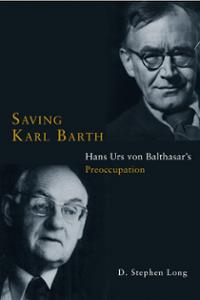D. Stephen Long: Saving Karl Barth
 Stephen Long, Saving Karl Barth: Hans Urs von Balthasar’s Preoccupation (Minneapolis: Fortress Press, 2014), 272 pages, ISBN 1451470142
Stephen Long, Saving Karl Barth: Hans Urs von Balthasar’s Preoccupation (Minneapolis: Fortress Press, 2014), 272 pages, ISBN 1451470142
Stephen D. Long, professor of systematic theology at Marquette University, presents a remarkable rendering of the long ecumenical discussion and theological friendship between Hans Urs von Balthasar and Karl Barth. While Balthasar received significant backlash for this friendship, he felt that in Barth he had discovered a Protestant theology grand enough to enter into a discussion with Catholic theology. Long primarily follows the younger Balthasar’s interpretation of Barth and traces the influence of Barth’s theology—albeit not uncritically—on Balthasar. This relationship allowed both theologies to interact, challenge, and shape the other at their strongest and most divisive points. While disagreements continued to exist, Long suggests ultimately a stronger theology emerged.
The work begins with a description of Barth’s and Balthasar’s largely unknown friendship that involved not only Balthasar’s book on Barth, but vacations, participation in each other’s seminars, and extensive letter writing. Balthasar rarely made the friendship public due to both Catholic and Protestant disagreement with his Barthian preoccupation. This chapter alone will be of interest to scholars. The second and third chapters set out Balthasar’s reading of Barth and the contemporary rejection of that reading from both Catholic and Protestant theologians. The remainder of the work rehabilitates Balthasar’s reading of Barth for contemporary theology. In turn, Long examines Balthasar’s interaction with Barth on the realm of God dealing with the question of natural theology and revelation, the realm of ethics dealing with the move from a propositional ethic to one that spreads the glory of the Incarnation to creation, and the realm of the Church as means for both renewal and unity.
Barth and Balthasar agreed that the incarnation, rather than a conception of God constructed from within the realm of natura pura (a state of pure nature), was the starting point of theology. Theology radiates outward from the incarnation into nature to define nature in light of the person and work of God-in-Christ becomes the challenge and beauty of the theological enterprise. To first discover God from nature and only then move towards the Incarnation and Trinity, places the unity of God ontologically prior to the Trinity and risks constructing a god from abstraction that inevitably conforms to the image of man rather than the particularity of the revealed God. Barth argued a natura pura does not exist for there is no place that exists into which God has not spoken in Christ (3); as such there is no need for an analogia entis (analogy of being) to bridge the creature-Creator gap. The dividing difference between Catholicism and Protestantism, therefore, was to be found in the analogia entis dogmatized in the Vatican I’s duplex ordo cognitionis (two-fold order of knowledge) that asserted a natural realm in which God could be known via reason outside of God’s revelation in Christ (155).
Category: In Depth, Summer 2014


